Table of Contents
Malaysia’s AI Landscape & What It Means For Businesses (2025)
Malaysia’s AI market has reached a critical turning point. The country is positioned to capture $115 billion of Southeast Asia’s AI-driven GDP by 2030, creating numerous opportunities for growth and innovation.
But we also begin to ask,
“How will AI affect my business?”
“Will AI replace me at work?”
This piece explores Malaysia’s AI landscape, which brands are investing, showing how it affects vital sectors and examining development challenges.
The Rise of AI in Malaysia
Malaysia’s AI landscape has gained momentum, with 140 AI solution providers generating over RM1 billion in revenue as of July 2024.
Malaysian AI ecosystem covers sectors of all sizes, focusing on digital health, digital cities, and agriculture. About half of Malaysian consumers (47%) now prefer to interact with brands through AI. Companies are moving faster too, as 33% of them want to improve customer experience through AI adoption.
Key players in the Malaysian AI ecosystem
Global tech giants are actively investing in Malaysia’s AI potential, recognising its strategic importance in the region. These investments not only bolster the country’s digital infrastructure but also foster a thriving AI ecosystem.

Google is investing US$2 billion in Malaysia to accelerate the country’s digital transformation. This includes building its first data centre and Google Cloud region in Greater Kuala Lumpur.
Google Cloud offers a comprehensive AI platform, and the partnership aims to boost Malaysia’s GDP by over US$3.2 billion and create 26,500 jobs by 2030, according to an independent analysis. This collaboration aligns with Malaysia’s digital economy initiatives and the MADANI Economy Framework.
IBM

IBM has been a key voice for AI in Malaysia. Speaking on popular podcasts like BFM and news organisations highlighting their data –
75% of CEOs believe that they’ll develop a competitive advantage by implementing AI.
Dickson Woo, the Managing Director of IBM Malaysia, mentions that in 2025, local organisations will look toward adopting cost-effective medium to small language models.
IBM has also committed to training two million learners in AI by the end of 2026, working with Universiti Malaysia Terengganu and training partners to launch AI coursework, IBM’s SkillsBuild.
IBM launched an AI platform called watsonx empowering business owners with generative AI for core business workflows to drive productivity.
Microsoft

In 2024, Microsoft announced it would be investing US$2.2 billion to support Malaysia’s digital transformation – the single largest investment in its 32-year history in Malaysia.
Microsoft’s investment covers:
- building cloud and AI infrastructure in Malaysia
- creating AI skilling opportunities for an additional 200,000 people in Malaysia
- strengthening its partnership with the Government of Malaysia to establish a national AI Centre of Excellence and enhance the nation’s cybersecurity capabilities
- supporting the growth of Malaysia’s developer community.
In addition to the substantial investments from global tech players, the Malaysian government is also playing a crucial role in driving AI adoption and innovation.
Malaysian Government AI Initiatives
National AI Office (NAIO)
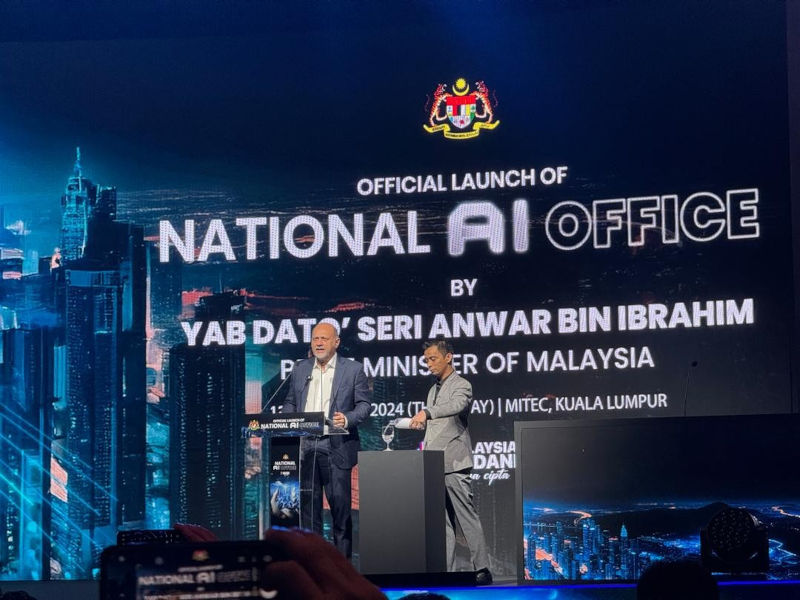
The Official Launch of NAIO. Credit: Ahmad Firdaus
The National AI Office (NAIO), approved to be established by the Cabinet on 28 August 2024, serves as the central authority to champion Malaysia’s AI agenda. Aimed to position Malaysia as a regional leader in AI technology and applications and promote the widespread adoption of AI.
Key Deliverables
The National AI Office (NAIO) in Malaysia focuses on boosting the nation’s AI capabilities. Here are the main things it aims to achieve:
- Create the AI Technology Action Plan 2026–2030
- Set up an “AI Adoption Regulatory Framework”
- Release an “AI Code of Ethics”
- Carry out an “AI Impact Study for Government”
- Publish the “National AI Trend Report”
- Develop datasets related to AI technology
- Launch initiatives to accelerate AI technology adaptation
These efforts aim to make Malaysia a leader in AI technology while ensuring ethical usage to improve the livelihood of people and businesses.
Budget 2025 AI Adoption
Budget 2025 prioritises the growth of Malaysia’s high-tech sectors, including Artificial Intelligence (AI), robotics, and the Internet of Things (IoT).
Benefits for companies include:
- Tax Incentives:
- Deductions for training and development in emerging technologies.
- Tax breaks for creating high-paying jobs in AI and data science.
- R&D Support:
- Double tax deductions for AI-related R&D.
- RM1 billion fund for talent development in smart manufacturing, health tech, and green solutions.
- Talent Access:
- Simplified hiring process for foreign AI graduates from Malaysian universities.
- Education Partnerships:
- Collaboration with universities and TVET institutions for specialized AI training programs.
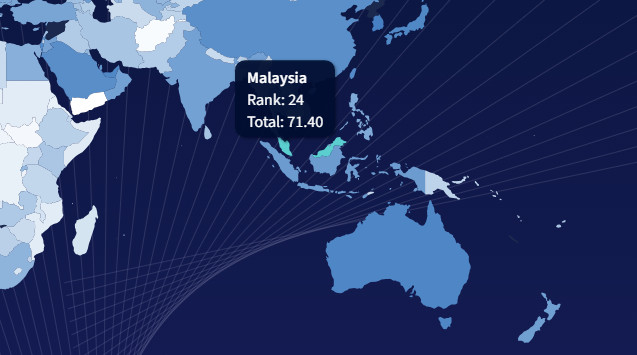
Malaysia’s Government AI Readiness Index 2024 ranking. Credit: Oxford Insights
The government’s desire for AI adoption is further made evident with the Oxford Insights Government AI Readiness Index 2024, which ranks Malaysia in the 29th spot out of 188 countries.
Applications of AI in Malaysia
AI is changing how we live and work in Malaysia. A speech at the Malaysia Digital Tech Adoption Summit mentioned that by 2030, AI is expected to generate approximately US$115 billion in productive capacity for Malaysia.
This contribution to our national GDP demonstrates AI’s potential across five sectors: manufacturing, healthcare, finance, and public services.
Healthcare
Studies have dived into how AI can improve laboratory efficiency, AI’s use in genomic medicine, AI mental health support and more, with one study showing that AI was better at detecting early breast cancer (91%) than radiologists (74%).
In Malaysia, Gleneagles Kuala Lumpur has been an early adopter of automation, using Robotic Process Automation (RPA) to address critical challenges in hospital bill payments and streamline its finance operations.
However, in statements from Gleneagles’ doctors, while they speak of the benefits of adopting AI in healthcare-related procedures, they do not specify whether these devices are used in their practice.
As the Ministry of Health’s senior principal assistant director Dr Mohamad Fadli Kharie says, “AI in Malaysian healthcare is in its early stages.”
This sentiment is seen across the board, but the global AI in healthcare market size is rising rapidly and is predicted to do so in the coming years. Between 2022 and 2023 alone, the market grew by 45%, from $15.4 billion to $22.4 billion.
Public Services
Kuala Lumpur jumped 16 spots in the Institute for Management Development’s Smart City Index, now ranking as the 73rd smartest city globally.
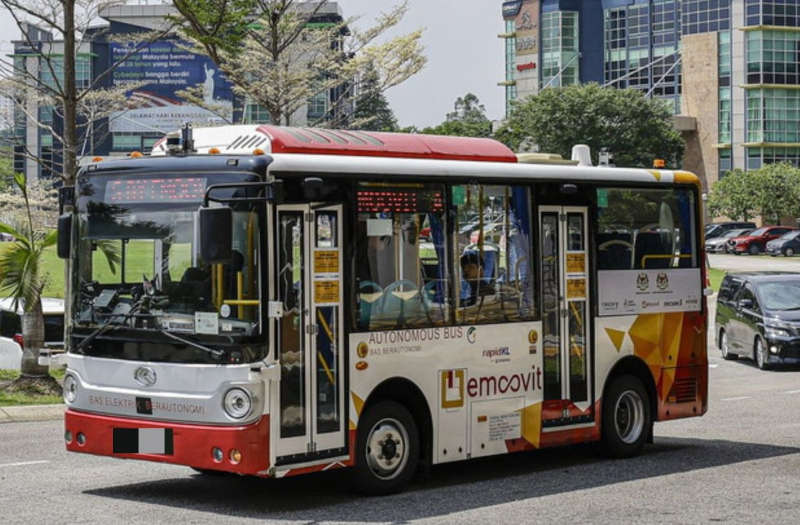
Autonomous bus in Putrajaya. Credit: The Star
In alignment with the Smart City Framework, which many credit for the progression of AI adoption across public services, we have seen the launch of 5G-enabled autonomous buses equipped with high-definition cameras, real-time Vehicle-to-Everything (V2X) technology for passenger safety in Putrajaya.
A Deloitte study found that smart technology could help reduce crime by 30% to 40% and reduce response times for emergency services by 20% to 35%.
In Malaysia, the Next Generation Emergency Services 999 (NG999), set to replace the existing emergency service system by 2026, promises the use of data analytics and AI to provide more efficient emergency responses.
However, with concerns raised on infringement of fundamental principles, perpetuating racial bias and discriminatory practices, we have yet to hear of any AI adoption in crime prevention in Malaysia.
AI Fact-check Assistant (AIFA)
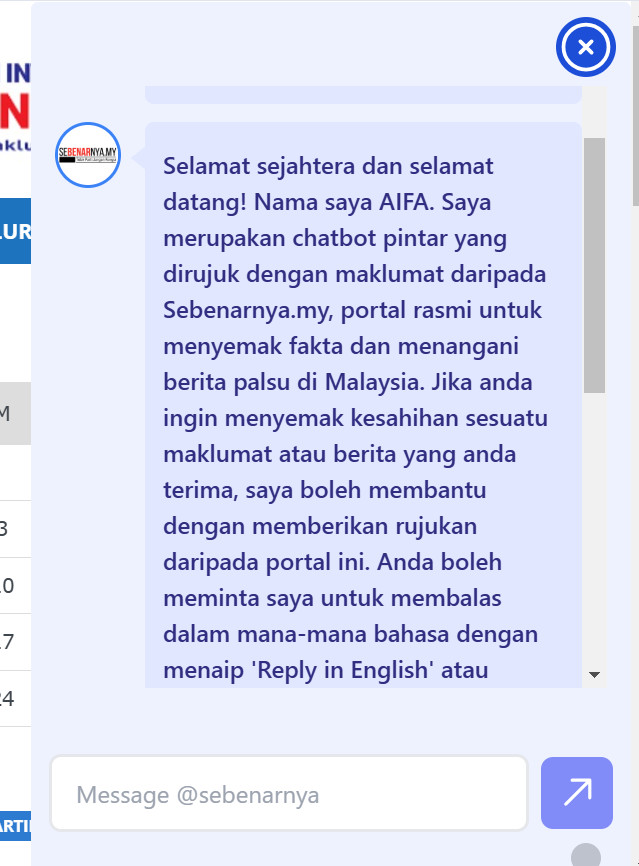
AIFA on sebenarnya.my website’s introducing itself.
Malaysia has introduced AIFA (Artificial Intelligence Fact-Checking Assistant), an AI-powered chatbot designed to combat misinformation on WhatsApp and sebenarnya.my (the fact-checking portal launched in 2017). Launched by the Communications Ministry, AIFA helps users verify viral messages, news articles, and trending topics using real-time data and AI-driven fact-checking.

Conversation with AIFA where it’s unable to answer a query.
The AIFA AI chatbot demonstrates a developing level of maturity, showcasing basic functionality by directing users to resources and identifying its limitations when faced with ambiguous queries.
While it effectively provides fact-checking support and acknowledges when more context is required, its natural language processing (NLP) capabilities are limited, as it struggles with open-ended or general questions. AIFA relies heavily on user input rather than proactively aggregating or analysing data to offer dynamic responses.
AIFA would benefit from improved NLP algorithms for contextual understanding, real-time data integration for proactive insights, and a mechanism for learning from user interactions to refine its performance and enhance user experience.
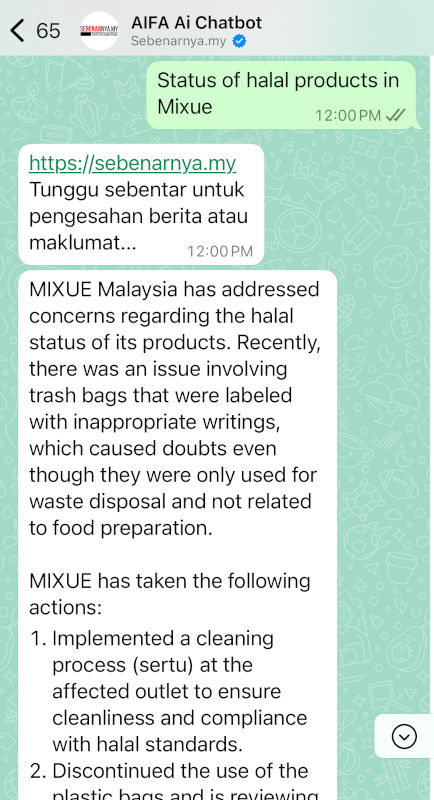
AIFA answering in English.

AIFA translating to Tamil.
Languages Supported:
- Malay
- English
- Mandarin
- Tamil
Try it out at sebenarnya.my or on Whatsapp at +603 8688 7997.
Manufacturing
Malaysia’s manufacturing sector has been embracing AI-powered automation and smart factory technologies, aligning with the global Industry 4.0 movement. While the country is positioned between Industry 2.0 and 3.0, there are significant efforts to advance towards Industry 4.0.
Studies by Deloitte show that smart factories could increase production capacity by up to 20% and reduce costs by up to 15%.
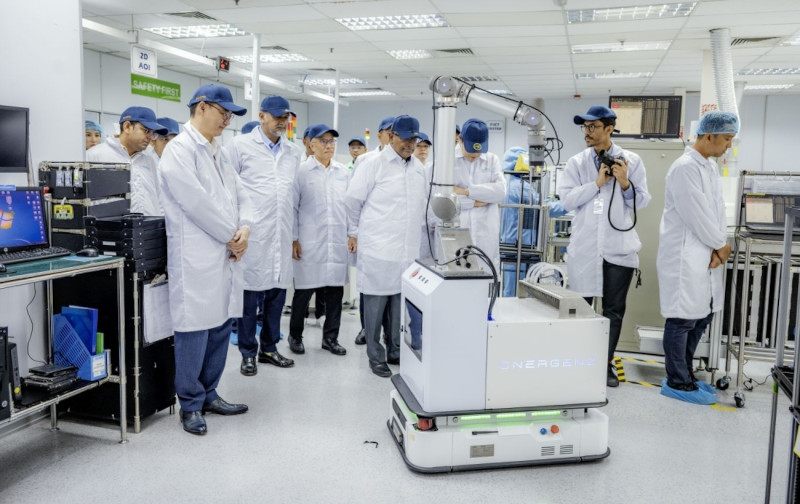
Clarion Malaysia. Credit: Soya Cincau
Clarion Malaysia showcased its successful trial of Malaysia’s first 5G-enabled manufacturing line. With Yes 5G and AI, Digital News Asia reported that Clarion has cut its manufacturing processing time by 70%.
Business Times reports that Smart Modular utilises AI-powered high-speed precision industrial robots to identify and isolate manufacturing defects based on the IBM Maximo Visual Inspection solution.
KVC Industrial Supplies Sdn Bhd has automated its finance department’s procure-to-pay process by leveraging IBM’s robotic process automation.
Finance
In 2023, Maybank introduced a shariah-compliant and hyper-customised Discretionary Portfolio Mandate (DPM) that employs AI to support fully active asset management, calculating expected returns for at minimum 25,000 listed equities using financial and non-financial datasets.
In 2024, Maybank entered into a collaboration with Bank of Hangzhou for cross-border business and advancing AI digital innovation. Maybank’s MAE app also uses AI to help with money insights, planning, and tracking.
Excelerate also reports CIMB Malaysia, Bank Muamalat, Mashreq Al Islami Bank, and AmBank are pursuing AI implementation in HR and admin processes, customer service and data analytics.
Their report notes that 3 out of 5 surveyed bank representatives mentioned one Generative AI project in use in their banks, and 4 out of 5 reported Generative AI projects in development.
The figures above indicate Malaysia’s finance industry’s rapid adoption of AI.
Agriculture
AI is changing the game in Malaysia’s agriculture industry.
Paddy Fields

Drone used for Smart SBB. Credit: Kosmo Digital
The Smart Sawah Berskala Besar (Smart SBB) introduced in 2021 uses drones and AI to help paddy fields increase productivity.
In Sekinchan, Selangor, an area over 100 hectares increased its average yield approximately 4 times over the span of a year and half in the programme, from 2.5 tonnes per hectare to above eight metric tonnes per hectare. This area in 2024 reported fruitful yields ranging from 10 to 12 tonnes per hectare.
Palm Oil Plantations
Regarding palm oil plantation management, a study used YOLO (You Only Look Once) deep learning models with drone and satellite imaging technologies to detect oil palm trees.
By examining the F1-Score—a measure of precision and recall—YOLOv8 scored between 97.36 % and 99.31 % and had detection times between 28 and 51s, which means this technology is suited to monitoring sparsely inhabited areas which may be hard for humans to travel to.
Malaysia’s AI roadmap for 2021-25 includes developing autonomous robots as part of the “Autonomous Robotics in Oil Palm Harvesting Management System”, aiming to boost its leading position in vegetable oil exports.
Challenges Facing AI Development in Malaysia
Malaysia’s rapid AI growth faces several important challenges that need solutions for long-term development.
Job Displacement
AI automation could impact 30% of Malaysian jobs by 2030. The manufacturing and service sectors stand at the highest risk, as 50% of work time in Malaysia is spent on highly automatable activities.
Minister Chang Lih Kang states more than 600,000 workers require reskilling training in three to five years to remain relevant in the increasingly competitive job market.
Despite that, by 2030, the country is projected to require an additional 500,000 skilled workers to meet the demands of the technology and technical sectors. AI is estimated to create 133,000 new jobs in businesses of all types, primarily in technology and data analytics.
Check out multiple in-depth studies by TalentCorp on AI, Digital, and Green Economy in various industries in Malaysia.
Resource Limitations
A 2022 report from the Malaysian Productivity Corporation (MPC) highlighted that 80% of Malaysian companies are still at levels 1 and 2 of technology adoption.
Furthermore, small businesses struggle with high implementation costs. An average AI system costs between RM500,000 to RM2 million as an original investment.
However, digital providers such as VeecoTech Solutions are developing affordable custom AI models for business optimisation.
Ethical and Regulatory Concerns
Data privacy remains the primary concern, as 60% of Malaysians worry about AI-integrated devices misusing personal data.
In June 2024, Malaysia amended the Personal Data Protection Act (PDPA), expanding its scope and obligations. This includes introducing the right to data portability and increasing penalties for data breaches.
Then, in September 2024, the Ministry of Science, Technology and Innovation released guidelines on AI governance and ethics.
The objectives of the national guideline on AIGE.
However, Malaysia has no specific law or regulation directly addressing artificial intelligence (AI). Without concert AI governance frameworks, implementation standards remain inconsistent.
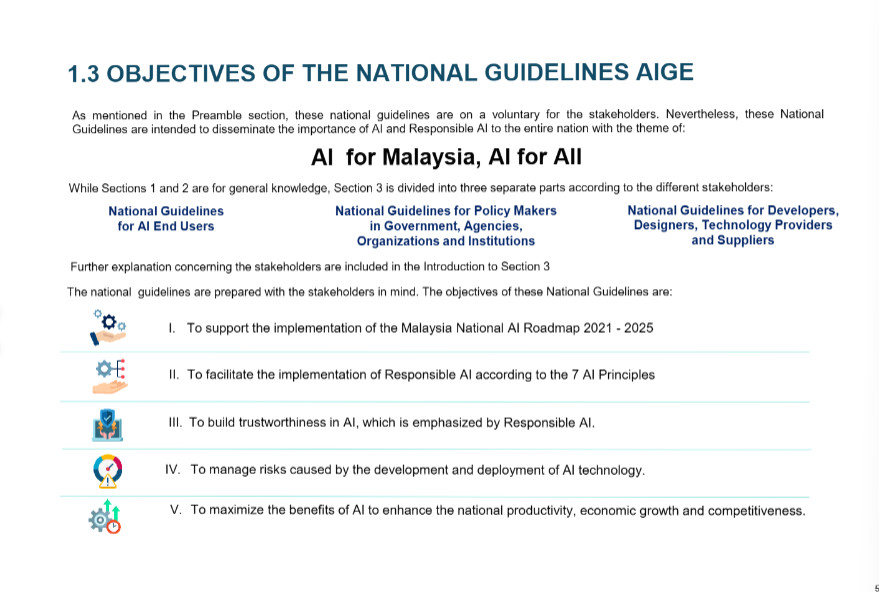
Opportunities for SMEs and Startups to Adopt AI in 2025
AI adoption is transforming the landscape for small and medium enterprises (SMEs) in Malaysia, offering significant opportunities for productivity enhancement and digital transformation.
To address the challenges SMEs face in adopting AI, such as high costs and skills gaps, the government has introduced several programs.
| Program | Description |
| Malaysia Digital Catalyst Grant (MDCG) | Offers up to RM1 million or 50% of project costs to drive innovation in Malaysia’s digital sector, with AI being a key target area. Focused on fostering scalable, high-impact solutions, the grant supports projects within the Malaysia Digital Promoted Sectors for up to one year. |
| AI Untuk Rakyat (AI for the People) |
A self-learning online programme by MyDIGITAL in collaboration with Intel.
Available in 4 languages (Bahasa, English, Tamil & Mandarin). |
| AI Sandbox Pilot Programme | Establish up to 900 AI startups and the development of at least 13,000 new AI talents by 2026. |
| MyDataHub.Ai Platform | Launched by MDEC and Dattel Asia Group, this platform helps SMEs gain access to RM150 million in financing. It connects businesses and partners, allowing the exchange of data and strategies, encouraging SMEs to adopt digitalization and AI strategies. |
Read about more Malaysian government grants in this article!
The Future of AI in Malaysia: Embracing Innovation and Preparing for Change
AI is no longer just an emerging trend—it is actively reshaping businesses across Malaysia. Companies that embrace AI will enhance efficiency, improve customer experiences, and unlock new growth opportunities. From automating repetitive tasks to enabling data-driven decision-making, AI can help businesses streamline operations and stay competitive in a rapidly evolving market.
Rather than replacing jobs entirely, AI is augmenting human capabilities, allowing professionals to focus on higher-value tasks like strategic planning, problem-solving, and innovation. However, adapting to AI requires businesses to invest in the right tools, upskill their workforce, and implement AI responsibly.
For companies looking to integrate AI into their operations, VeecoTech offers custom software development and AI-driven solutions to support digital transformation. Whether you’re exploring automation, machine learning, or data analytics, the right AI strategy can help future-proof your business.
Now is the time to embrace AI, explore new possibilities, and drive business success in Malaysia’s digital future. Learn more about how AI can empower your business with VeecoTech’s software development solutions.
Frequently Asked Questions
How is Malaysia’s AI ecosystem evolving compared to neighbouring countries like Singapore and Indonesia?
Malaysia’s AI ecosystem is growing rapidly, driven by government initiatives such as MyDIGITAL and partnerships with global tech players like NVIDIA. While Singapore leads in AI research and development, and Indonesia focuses on large-scale AI adoption, Malaysia is carving its niche in AI-driven digital services, SMEs digital transformation, and AI talent development programs. Programs like AI Sandbox and AI Untuk Rakyat aim to balance talent growth with innovation.
Will AI Adoption in Malaysia Lead to job displacement?
AI adoption may reshape job roles in Malaysia, but proactive efforts are in place to ensure a smooth transition. Here’s how Malaysians and businesses can navigate this shift and the skills needed for the future:
How Malaysia is Addressing the Shift
- Upskilling and Reskilling
- Programs like AI Untuk Rakyat and MyDigitalWorkforce Movement help Malaysians build AI, data analysis, and coding skills for future-proof careers.
- New Job Creation
- The AI Sandbox Pilot Programme aims to establish 900 AI startups and create 13,000 AI-related jobs by 2026.
Skills for Future-Ready Talent
- AI and Data Literacy – Understanding AI applications and data-driven decision-making.
- Programming and Automation – Basics of Python, R, or machine learning models.
- Adaptability & Continuous Learning – Staying updated with evolving AI tools and trends.
- Problem-Solving & Creativity – Essential for roles requiring strategic thinking and innovation.
- Soft Skills – Strong communication, collaboration, and emotional intelligence to work alongside AI systems.
How will Deepseek affect Malaysia’s AI market?
The emergence of China’s AI startup DeepSeek has sparked global market shifts, but Malaysia’s Digital Minister, Gobind Singh Deo, has reassured stakeholders that its impact on the local AI market and data centre boom is not negative.
Despite significant sell-offs in global chipmaker stocks like Nvidia, which saw a 17% drop in share price and a $600 billion loss in market capitalisation, Gobind emphasised that “DeepSeek represents an opportunity rather than a threat to Malaysia’s AI ecosystem.” He added, “Malaysia’s focus remains on innovation and leveraging AI advancements to drive economic growth.”
Locally, companies such as YTL Power International Bhd and NationGate Holdings Bhd have experienced setbacks, with concerns over reduced demand for high-end chips.
YTL Power, an NVIDIA cloud partner, faces uncertainty regarding the demand for its incoming GB200 chips, while NationGate, which heavily relies on AI server sales, grapples with export restrictions.
However, the minister underscored that Malaysia’s growing digital economy and its commitment to fostering a robust AI ecosystem will ensure long-term resilience and adaptability to global changes, positioning the country as a competitive player in the AI sector.






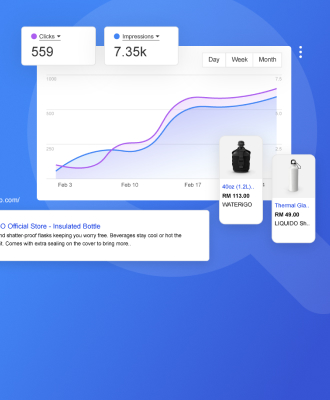



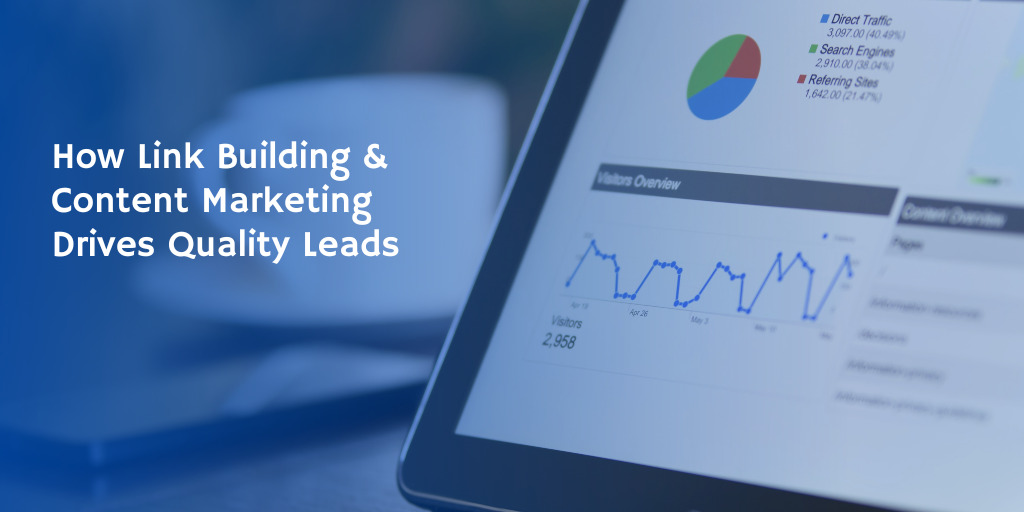

Leave A Comment